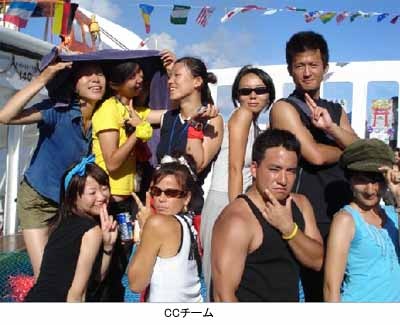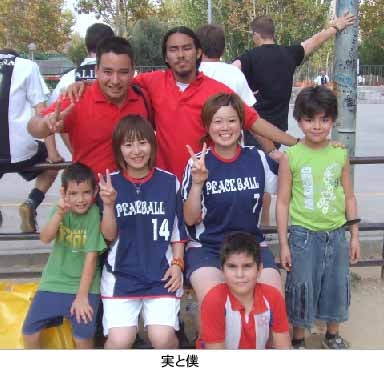一昨年、大学に通っている間、憲法9条のドキュメンタリー映画を見にいかないか、と大学の先生に誘われました。東京、六本木の洒落た映画館で、各国からきた留学生と一緒に見て、ディスカッションするイベント付き映画鑑賞でした。
ジャン・ユンカーマン監督の「映画 日本国憲法」というタイトルで、NGO法人ピースボートが主催していました。興味をそそられたのは映画が終わった後の監督自身のトークと留学生からの質問でした。
また、映画鑑賞後、グループになって議論をする場も設けてありました。英語圏の留学生が多かったので、各グループで誰かが英語と日本語で話さなければならず、自分が参加したグループでは僕が話しました。
もう何を話したかは覚えていないのですが、イベントの後にした会話は良く覚えています。
イベントのMC(司会)でピースボートスタッフのリカさんが僕に話しかけてきました:
「あきら君、素敵な意見ありがとう。通訳うまかったね。私はピースボートという国際NGO法人のスタッフで次の54回クルーズの通訳コーディネータをやるの。通訳をする代わりに無料で3ヶ月かけて世界一周しない?」
こんな感じに誘われたのですが、僕はこのピースボートという名前も初めて聞いたし、世界一周なんて話が美味しすぎるので断って、メール交換だけしました。もし、これが詐欺ではなく本当に3ヶ月で世界一周ができても、僕は大学生だからそんな長い休暇は取れない。
その2ヵ月後、通っていた国際基督教大学で「国連システムのリーダーシップと地球市民社会― グローバル公共政策の新領域(通称ICRA)」のフォーラムが行われ、そこにはピースボートのリカさんが招待されていました。ちゃんとした国際NGO法人 なのだなってこの時初めてわかりました。そして、またそこで誘われました。やはり3ヶ月は無理だからスペイン語圏の部分だけ、すなわち1ヶ月乗るのはどう かと。ちょうど、僕の夏休み期間とぴったり期間が合うので引き受けました。
早速1ヵ月後、船で通訳ができるかどうかの通訳試験を受けました。4時間に亘りスペイン語から日本語の翻訳、日本語からスペイン語の翻訳、同時通訳、一般常識テスト、そして最後に面接。気力を全部吸われた4時間でしたが、無事合格しました。
船に乗る三ヶ月前から週一回の通訳勉強会が始まりました。14人の同じ通訳仲間とチームになり、700人乗りの船の船内状況を考えながらいろんな訓 練を受けました。船内での仕事は主に、船内新聞の翻訳、水先案内人(船内ゲスト)の講演会通訳、イベントのMC、英語・スペイン語クラスの通訳などです。 各寄港地ではツアーに同行し、ガイドの通訳をします。
ここまでの話でわかる通り、通訳だけの仕事ではないので仕事名はコミュニケーション・コーディネーター、短く言うとCC(シーシー)。ほかのCCも みんないろんな意味で「濃い」人たちでした。英語CCが11人、スペイン語CCが僕を含めて3人。今では兄弟ぐらい信頼できる仲間になりました。出身は日 本だけではなく、インド、台湾、米国、メキシコ、そしてチリ。船に乗る1週間前には合同キャンプがあり、約20名の英語・スペイン語の先生とも仲良くなり ました。
ようやく、船が横浜を出港する日が来ました。僕は途中から乗ることになっていたので乗りませんでした。しかし、出港式っていうのは中々感動するもの ですね。昔、日本人たちが南米へ移住したときもこうやって出港式をやったんだろうな~、と勝手に想像して感動していました。家族や友人が旅立つ彼らにリボ ンを投げて、少しの間だけリボンを持ったもの同士が繋がっている気がする。特別なひと時をすごしました。一ヵ月後に会う仲間に最後の送り出しをし、家に帰 りました。
一ヵ月後、船がスペインのバルセロナに着岸する前に飛行機で先乗りをしました。現地で待っていたのは、名前の通り「先乗り」をしているピースボート の関係者でした。一人はレオ、メキシコに長く住んでいた日本人、そしてもう一人、あやさんはスペインで育った情熱的な日本人女性。彼らも後に僕の仕事仲 間、そして絆の深い友人になる人たちですが、その話は次の記事で。
このとき、僕はある人に会うのをすごく楽しみにしていました。通訳研修をしている間に出会った、もう2人のスペイン語CCとスペイン語の先生です。 CCの1人はパナマに長く住んでいた日本人のメグさん、もう1人は日系メキシコ人のグティエレス実(ミノル)。彼は父がメキシコ人、母が日本人で、生まれ 育ちがメキシコ、グアダラハラ州。僕は、そんな彼と「同じ匂いがする!」とCC研修の最初から思っていました。メキシコでは通訳などの仕事をし、ピース ボートに乗るのはこれで3回目。よほどこの船旅が好きなのだろうな。ワンパクな21歳だが、どこか落ち着きがある。そしてもう一人!日系ペルー人の蒲田セ サル。彼はスペイン語の先生として船に乗っていて、彼とは今でも一緒に、1ヶ月に2回ほどボランティアで日系の子供たちに日本語を教えています。そんな興 味深い彼らです。
僕が船に着いてほかのCC仲間とのグループハグをした後、荷物を置き、すぐに「バルセロナ・サッカーツアー」に出かけました。この最初の仕事は実と一緒に行いました。実がメインの通訳者で、僕はそのサポートをしました。
このツアーの内容というのは約20人の参加者と一緒にFCバルセロナのスタジオと博物館を訪問した後、スペインに在住するパラグアイ人、グアテマラ 人、モロッコ人移民と一緒にサッカー交流(フットサル)をすることでした。実と僕は司会者の通訳や現地の人と日本人参加者とのやり取りの通訳を行いまし た。
ここで思い始めたのが、この仕事は日系人にすごく向いているな~ってことでした。このCCとしての仕事は「言葉」のみを通訳するのではなく、その感 情や行動をうまく相手に伝えることですので、日系人が持つ「両文化の理解力」を武器にしたらかなり良い仕事ができるのではないかと思うのです。あとになっ て聞いたのですが、このスペイン語CCの仕事によく日系人がつくそうです。
*ピースボートに興味のある方は、こちらをご覧ください>> 日本語 / ENGLISH
© 2008 Akira Uchimura








